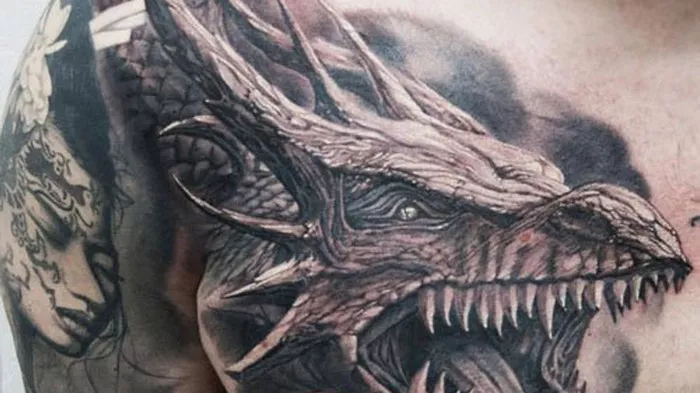In the realm of body art, few designs carry as much cultural significance and mystique as the dragon tattoo. For centuries, this mythical creature has captivated imaginations across various civilizations, from the majestic serpentine dragons of Chinese folklore to the fierce, fire-breathing beasts of Western mythology. Beyond their aesthetic appeal, dragon tattoos hold profound symbolism, reflecting a diverse array of meanings and interpretations that resonate with individuals worldwide.
Origins and Cultural Significance
To understand the symbolism of dragon tattoos, one must delve into the rich tapestry of cultural narratives from which they emerge. In many Eastern cultures, particularly in China and Japan, dragons are revered as potent symbols of power, wisdom, and good fortune. Unlike their Western counterparts, which are often depicted as malevolent creatures to be vanquished by heroes, Eastern dragons are benevolent beings associated with auspicious qualities.
In Chinese culture, the dragon holds a position of paramount importance, representing the emperor and the imperial family. Known as the divine ruler of the sky and water, the Chinese dragon symbolizes strength, prosperity, and the cosmic forces of nature. Its sinuous form embodies the harmony of yin and yang, the complementary forces that underpin the universe. Dragon motifs adorn countless artifacts, temples, and artworks throughout Chinese history, signifying protection and prosperity.
Similarly, in Japanese folklore, dragons, or “Ryū,” are revered as celestial beings capable of bringing rain and controlling the elements. They are often depicted as serpentine creatures with colorful scales and fierce expressions, embodying the primal forces of nature. Japanese mythology is replete with tales of heroic deeds involving dragons, highlighting their role as guardians and mentors to worthy individuals.
Symbolism and Personal Meaning
Beyond their cultural connotations, dragon tattoos hold deeply personal significance for those who choose to adorn their bodies with these mythical creatures. The symbolism of a dragon tattoo can vary widely depending on the individual’s beliefs, experiences, and intentions. For some, the dragon represents inner strength and resilience, serving as a reminder of their ability to overcome adversity and emerge victorious in the face of challenges.
In this context, the act of getting a dragon tattoo can be seen as a form of empowerment, a declaration of one’s courage and determination to confront life’s obstacles head-on. The dragon’s fearsome visage and formidable presence serve as a source of inspiration, instilling confidence and fortitude in the wearer.
For others, the dragon may symbolize transformation and rebirth, echoing the mythical creature’s ability to shed its old skin and emerge renewed. In many cultures, dragons are associated with the cycle of life, death, and renewal, embodying the eternal process of transformation and evolution. A dragon tattoo can thus serve as a potent symbol of personal growth and spiritual awakening, marking a profound shift in the individual’s life journey.
Variations in Symbolism
While the overarching symbolism of dragon tattoos remains consistent across cultures, there are subtle variations in interpretation that reflect the unique cultural contexts in which they are situated. In Chinese culture, for example, the color of the dragon holds particular significance, with each hue carrying its own symbolic meaning. A black dragon, for instance, is associated with water and the north, symbolizing wisdom and adaptability, while a red dragon represents fire and the south, embodying passion and vitality.
Similarly, the posture and demeanor of the dragon can convey different shades of meaning. A dragon in flight may symbolize freedom and transcendence, while a coiled dragon might represent hidden potential and latent power. These nuances in symbolism allow individuals to personalize their dragon tattoos according to their own values and beliefs, imbuing them with deeper layers of meaning and significance.
Modern Interpretations and Trends
In contemporary tattoo culture, dragon tattoos continue to hold sway as one of the most popular and enduring designs. While traditional motifs inspired by Eastern mythology remain prevalent, there has been a growing trend towards fusion styles that blend elements of Eastern and Western dragon iconography. This cross-cultural exchange has led to the emergence of bold new interpretations that combine the intricate linework and symbolism of traditional Asian designs with the vibrant colors and dynamic compositions favored in Western tattoo art.
Moreover, the symbolism of dragon tattoos has evolved in response to shifting cultural attitudes and societal trends. In an increasingly globalized world, where boundaries between cultures are becoming increasingly porous, dragon tattoos serve as symbols of connection and cross-cultural exchange. They embody the universal themes of strength, resilience, and transformation that resonate with individuals from diverse backgrounds, transcending cultural boundaries and uniting people in a shared appreciation for the power of myth and symbolism.
Conclusion
In the intricate tapestry of body art, dragon tattoos stand out as enduring symbols of power, wisdom, and transformation. Rooted in the rich traditions of Eastern mythology and folklore, these mythical creatures hold profound cultural significance and personal meaning for individuals worldwide. Whether as a symbol of inner strength, spiritual awakening, or cultural identity, the dragon tattoo continues to captivate the imagination and inspire awe, serving as a timeless emblem of human creativity and resilience in the face of adversity.

